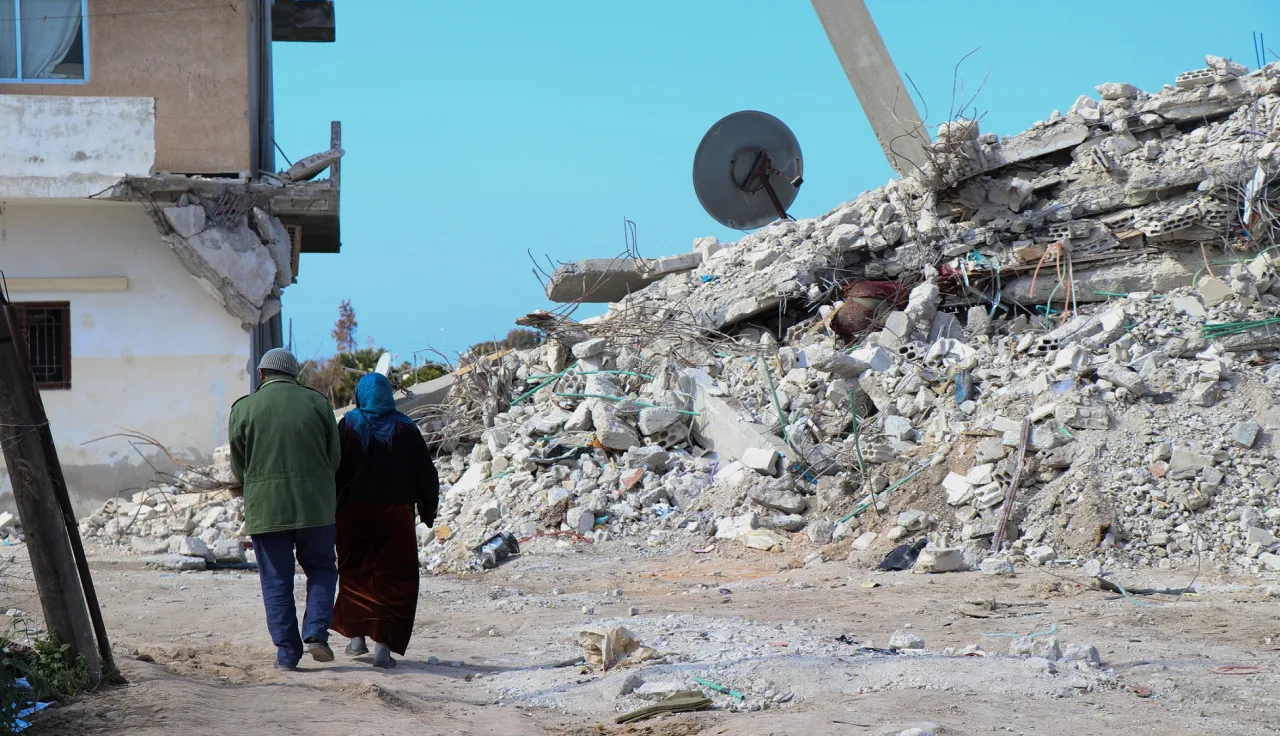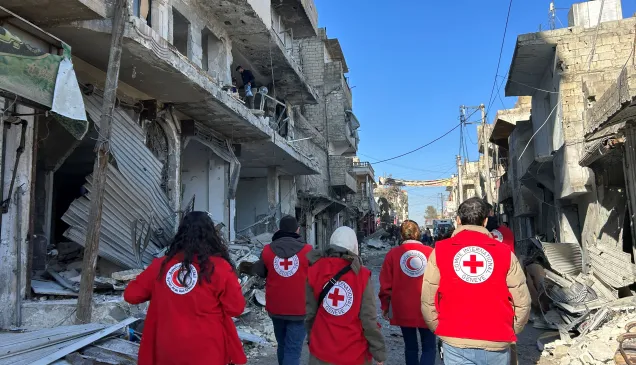Aleppo’s water system – which is so old that spare parts are no longer available for it – has come under increasing pressure, first from 12 years of conflict and now the earthquake. After losing their homes in the earthquake, more people today are relying on the same system to meet their water needs. Direct damage to essential parts of the infrastructure reduced the system’s efficiency and raised the risk that contaminated water could pollute the supply.
Additionally, many elevated water tanks on the roofs of houses were destroyed by the earthquake, leading to further stress on the system. Parts of the city’s sewage system, which was already heavily damaged during the conflict, collapsed, exacerbating the needs in a region already struggling to cope with the effects of more than a decade of conflict.
“The possibility of devastating public health consequences as a knock-on effect from the earthquake is frighteningly high. A new public health emergency such as the spread of infectious diseases would be a disaster for the region,” said Fabrizio Carboni, Near and Middle East regional director for the International Committee of the Red Cross in Syria who has been overseeing earthquake response operations.
Access to safe drinking water is a challenge affecting millions of people across Syria. Before 2010, 98% of people in cities and 92% of people in rural communities had reliable access to safe water. Today, only 50% of water and sanitation systems function properly across Syria.
“Communities have pulled together, sharing their food, water and clothes. Nevertheless, the scale and gravity of new needs in the affected region, and across Syria, requires increased assistance. Durable solutions for essential infrastructure are vital to public health. This is especially true for communities that have been harder for humanitarian actors to reach,” Mr. Carboni said.
For these communities, living in areas like Idlib where the living conditions are catastrophic and the needs are massive, the ICRC calls on all parties to the conflict to set aside political considerations and facilitate humanitarian work so that relief is provided to those who need it, regardless of the modality.
Thousands of people sought temporary shelter after the earthquake, leading to difficult living and sanitation conditions in Aleppo, Hama and Lattakia. At one temporary shelter site in Aleppo, 850 people are sharing seven toilets. At another site, in a former cement factory, children play ball close to areas contaminated by unexploded ordnances.
On the morning of the earthquake, ICRC teams delivered kits of medical supplies to Aleppo hospitals only hours after the quake hit. Since then, over 57,000 people in the affected areas have benefited from health assistance from the ICRC and Syrian Arab Red Crescent. They also provided water for people at six shelters in Aleppo and provided relief assistance to over 30,000 people that included food and essential items.
In 2022, the ICRC supported the rehabilitation of 32 water facilities across the country and more than 17 million people across Syria benefited from different water-related interventions. In recent years, the ICRC carried out, along with the Syrian Arab Red Crescent, thousands of engineering projects tackling water and sanitation systems across Syria aiming to provide sustained support to local service providers to curb the decline in service delivery across the country.
For more information, please contact:
Adnan Hizam, ICRC Damascus, ahizam@icrc.org or +963 113 380 6205
Imene Trabelsi, ICRC Beirut, itrabelsi@icrc.org or +961 3 13 83 53
Fatima Sator, ICRC Geneva, fsator@icrc.org or +41 79 848 49 08
Jessica Moussan, ICRC Dubai, jmoussan@icrc.org or +971 50 425 4091
More on ICRC's earthquake response:
Over the last four weeks, ICRC has been working together with the Syrian Arab Red Crescent (SARC) to respond to the needs of earthquake survivors in the last four weeks, including:
- Water trucking for six collective shelters in Aleppo for 10 days. Around 115,000 water bottles were distributed in in Aleppo, Latakia and Hama.
- Light rehabilitation for 24 collective shelters that have hosted the earthquake-affected families in Aleppo.
- Donated generators to three bakeries in affected areas in Latakia, which enable those bakeries to produce bread for around 200,000 people.
- More than 57,000 people in the affected areas are benefiting from different health support activities.
- 1,000 body bags were delivered to hospitals and forensics facilities in Aleppo and Latakia.
- Surgical medicines, medical supplies and equipment were donated to six hospitals in Aleppo, Latakia and Hama.
- The ICRC supported SARC mobile health units to provide basic health services/first aid to people in collective shelters in Aleppo, Latakia and Hama.
- More than 30,000 people received canned food and relief items in collective shelters in Aleppo, Latakia and Hama, including blankets, mattresses, solar lights, hygiene kits, and kitchen sets.
More on ICRC's work to improve access to clean water across Syria:
ICRC's work to improve access to water and essential infrastructure in Syria reaches more than 16.5 million people across Syria. This work includes:
- The ICRC supports the Al-Khafsa water treatment plant, located 80 km east of Aleppo city, which is one of the main sources of suppling millions of people with water. Al-Khafsa water treatment plant is irredeemably damaged, and it would take at least five years to rehabilitate this facility under stable conditions. If Al-Khafsa water treatment plant was not functioning, 3.2 million people would be affected with no alternative water source.
- 15 million people were supported by a disinfection programme to ensure safe drinking water in 13 governorates.
- 450,000 people received water delivered by trucks in Aleppo, Rural Damascus, Raqqa, and Hassakeh.
- Nearly 140,000 displaced people and returnees benefited from renovations and upgrading of housing, water, and sanitation in 44 collective shelters and neighbourhoods throughout the country.
- 32 water facilities across the country were rehabilitated and upgraded, and eight hospitals, 62 health points, and one physical rehabilitation centre had their infrastructure improved.
- Around 710,000 people benefited from the infrastructure support to 12 public bakeries – supply of production line, rehabilitation works, and power.
- The water, sanitation and hygiene facilities in over 280 schools and exam centres were rehabilitated – Damascus, Rural Damascus, Daraa, Sweida, Quneitra, Homs, Hama, Lattakia, Raqqa, Deir Ezzor, and Hassakeh governorates.




